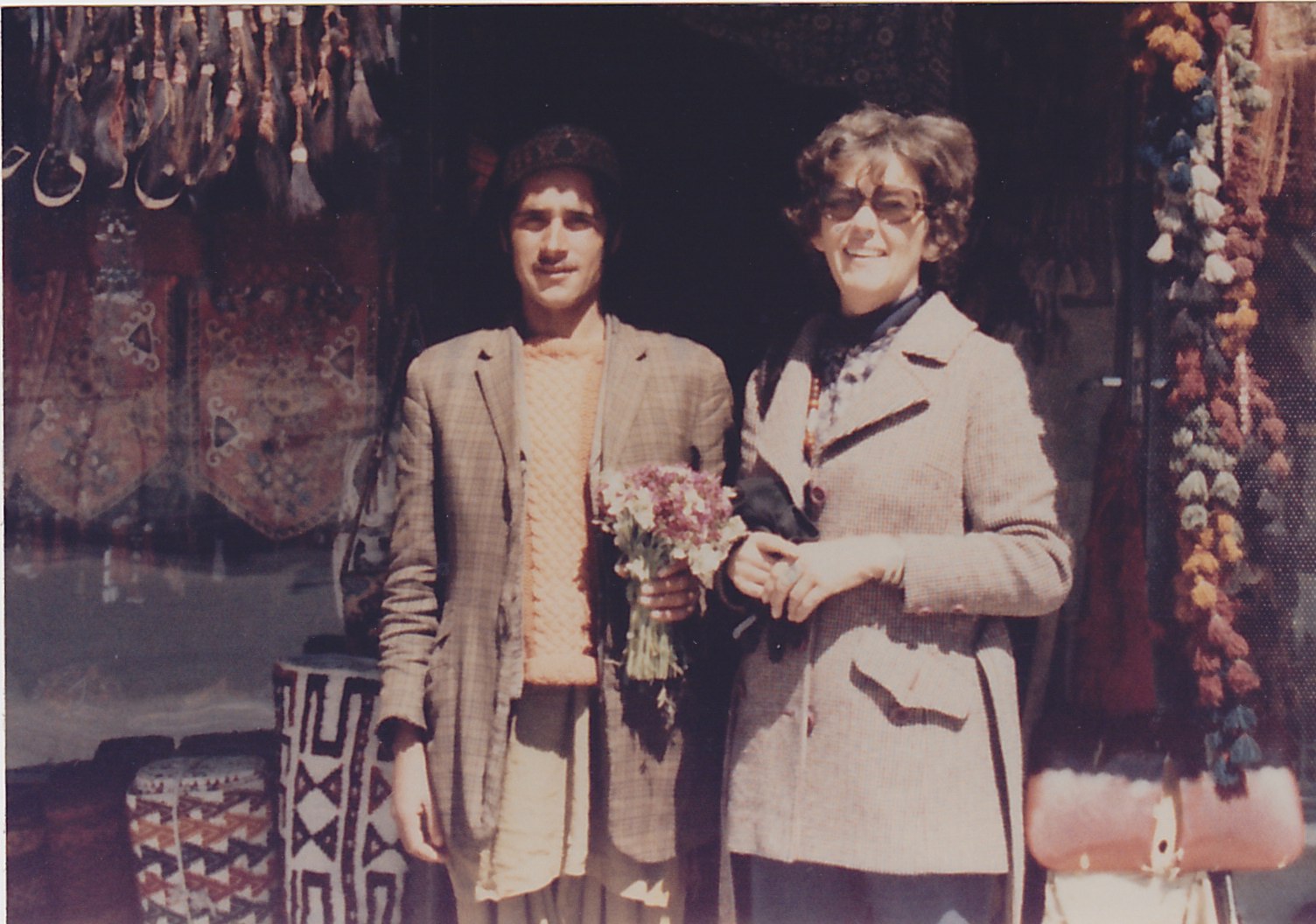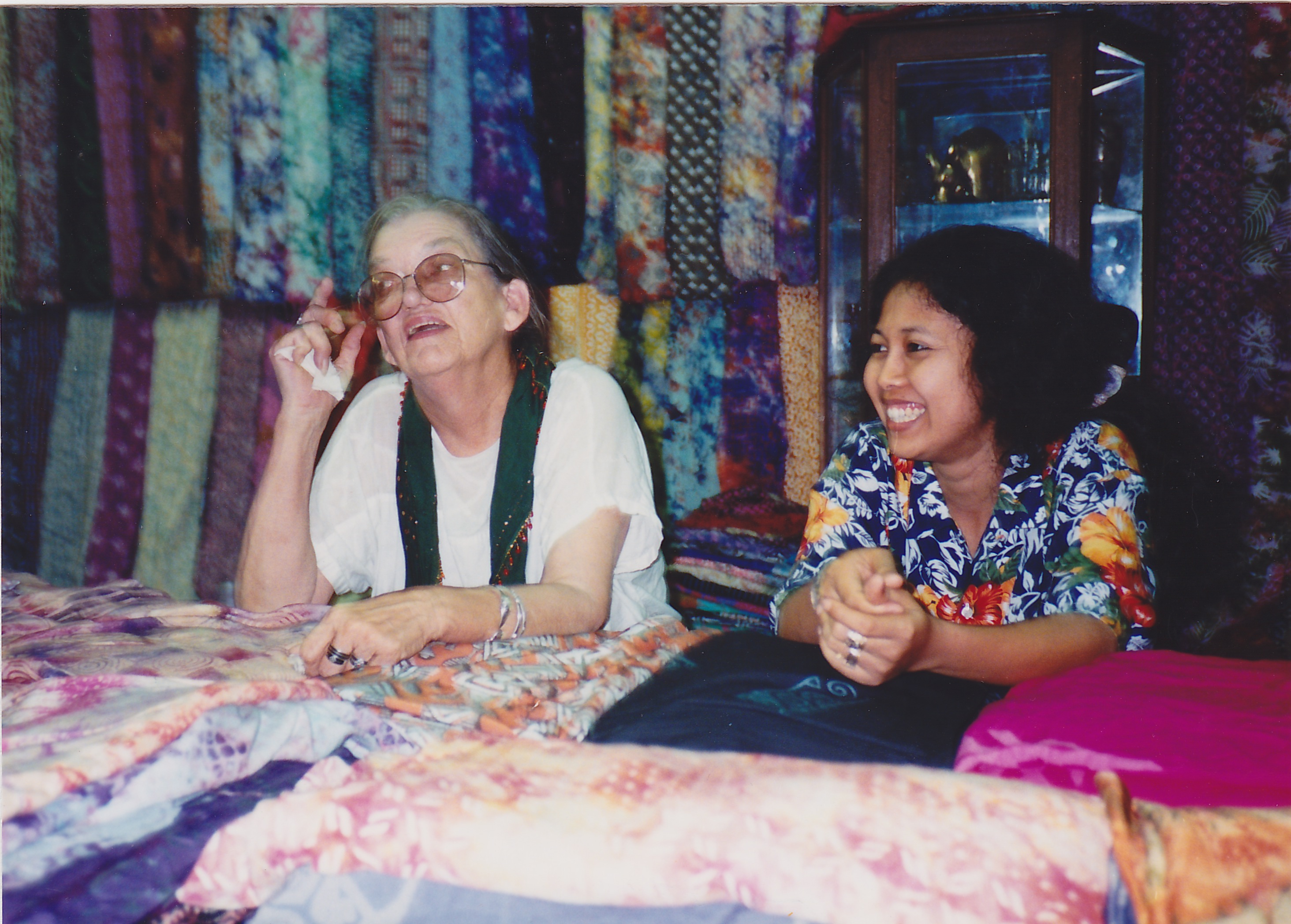
Kabul, Afghanistan in 1976

Bali around 1989 with one of our batik fabric suppliers
The beginnings of Yazdi go way back to the Middle East in the 1970’s when the world was quite a different place. The Shah of Iran was holding forth, and an adventurous woman with an unquenchable love of travel and foreign places was teaching English in the beautiful city of Isfahan. Noted for its architecture and gorgeous mosques, Isfahan lies in south central Iran, 175 miles from the ancient town of Yazd. For centuries Yazd was a center of Zoroastrianism, noted for its high quality of handicrafts. Its ancient bazaar still draws pilgrims and shoppers from far away, and it is there that Louise Jones was drawn across the desert in search of the beautiful & exotic. She discovered a passion for bead collecting that lasted her lifelong and it is during that time that she pursued the process of understanding the origins and history behind each piece she purchased. She was a natural anthropologist who was intensely interested in the local culture wherever she traveled, reading as much as she could of the history of the forces that defined the present day society. Before long she was making exceptional pieces of jewelry put together from her collecting and selling them in Seattle at specialty shops when she returned home on vacations.
Shortly before the Shah was deposed, Jones returned to Seattle, but not before making an extended trip across Asia in search of ‘anything she liked.’ She had an unruly drive to seek out & conquer superlative buys wherever she travelled. The result of these early travels was the opening of the first Yazdi in 1976 in the newly remodeled Pike Place Market. The shop was a pioneer in ethnically influenced clothing and has been described as one of the hidden jewels in the Market, reflecting her highly personalized taste & individualism, full of hand picked items from her travels. Yazdi, in Arabic meaning ‘person or thing from Yazd’, seemed almost a mirage to those who thirsted after real finds in unusual attire, offering unique Asian, South American, Indian, Thai, and Nepalese clothes and accessories that are nowadays difficult to find. She filled the shop with beautiful cloths and hand-wovens, painted and beaded antique fabrics, block prints and tribal jewelry–anything she found that she loved.
She continued to travel often, loving the experience of new places and what she might find. As the years went on she found it more difficult to import from certain countries in the Middle East and began to focus her trips on Bali. There she found a wealth of traditional textile art to inspire her own designs, and the facility to manufacture in a more focused way. The shop was changing to more clothing and accessories after its first years. Her daughter began to assist and travel with her and together they began to manufacture the Yazdi label clothing that has been so successful to this day. Produced by a number of separate, family owned factories, Yazdi is blessed to have strong ties with our friends in Bali and to be mutually supportive. Louise was known to extend a hand to her Balinese friends in need of loans or other help, and had many devoted acquaintances all over the world.
In 1986, Louise and her daughter opened a lovely new store at the Wallingford Center in north Seattle. A large and light filled space set in the old Interlake Public School, it was an opportunity to expand the business into a more diversified, contemporary woman’s clothing boutique. Many new lines were added to the eclectic mix and Yazdi became more of what it is today. In 1992, Louise died suddenly and left a void in the business that can never be filled. Her daughter Julia stepped up to manage the business and ensure its continued success. Since then, Yazdi has flourished and expanded at the Wallingford Center, opening a plus size shop, Yazdi II, in 1997. The 2 shops are now adjacent, and more than ever, a great place to find beautiful and different things from all over the world, including our wonderful US of A.
Shortly before the Shah was deposed, Jones returned to Seattle, but not before making an extended trip across Asia in search of ‘anything she liked.’ She had an unruly drive to seek out & conquer superlative buys wherever she travelled. The result of these early travels was the opening of the first Yazdi in 1976 in the newly remodeled Pike Place Market. The shop was a pioneer in ethnically influenced clothing and has been described as one of the hidden jewels in the Market, reflecting her highly personalized taste & individualism, full of hand picked items from her travels. Yazdi, in Arabic meaning ‘person or thing from Yazd’, seemed almost a mirage to those who thirsted after real finds in unusual attire, offering unique Asian, South American, Indian, Thai, and Nepalese clothes and accessories that are nowadays difficult to find. She filled the shop with beautiful cloths and hand-wovens, painted and beaded antique fabrics, block prints and tribal jewelry–anything she found that she loved.
She continued to travel often, loving the experience of new places and what she might find. As the years went on she found it more difficult to import from certain countries in the Middle East and began to focus her trips on Bali. There she found a wealth of traditional textile art to inspire her own designs, and the facility to manufacture in a more focused way. The shop was changing to more clothing and accessories after its first years. Her daughter began to assist and travel with her and together they began to manufacture the Yazdi label clothing that has been so successful to this day. Produced by a number of separate, family owned factories, Yazdi is blessed to have strong ties with our friends in Bali and to be mutually supportive. Louise was known to extend a hand to her Balinese friends in need of loans or other help, and had many devoted acquaintances all over the world.
In 1986, Louise and her daughter opened a lovely new store at the Wallingford Center in north Seattle. A large and light filled space set in the old Interlake Public School, it was an opportunity to expand the business into a more diversified, contemporary woman’s clothing boutique. Many new lines were added to the eclectic mix and Yazdi became more of what it is today. In 1992, Louise died suddenly and left a void in the business that can never be filled. Her daughter Julia stepped up to manage the business and ensure its continued success. Since then, Yazdi has flourished and expanded at the Wallingford Center, opening a plus size shop, Yazdi II, in 1997. The 2 shops are now adjacent, and more than ever, a great place to find beautiful and different things from all over the world, including our wonderful US of A.
